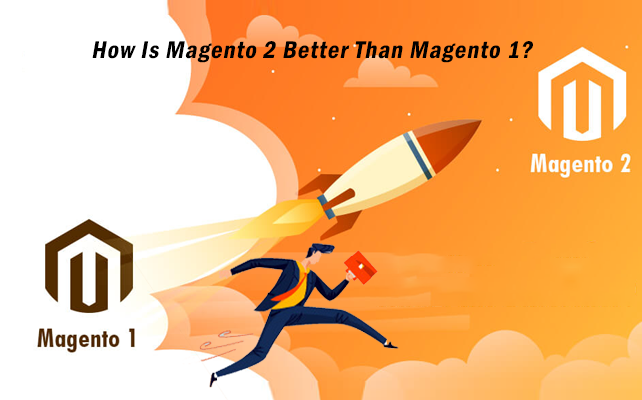
Magento 2 is a later version, so it is obvious it will have more features, better tools, and various security updates. If you are a new customer, you must go for the new version as the support for Magento 1 is about to be over, so that it won’t receive any updates so that it won’t be a secure option.
Here, the question is if you are already a Magento 1 user, then whether you should switch or not to Magento 2. So let us look at the detailed specification of both versions to decide.
Architecture

The tech stack of Magento is a lot more advanced than the Magento 1; a lot of new technologies have been added like Nginx version 1.7 or higher, Symphony, Apache, Composer. So the architecture of the Magento 2 is a lot more advanced and better than Magento 1. This advancement has clearly improved the performance of the Magento 2.
The details of the versions used in Magento 1 are Apache 2.x, PHP 5.5.x – 5.5.x, MySQL, Solr, HTML, JQuery (in latest themes), Zend Framework 1.
Magento 2 has: Apache 2.2/2.4, Nginx 1.7 or higher, PHP 5.6.x/7.0.2/7.0.6, MySQL/MySQL Percona or higher, Varnish 3.x/4.x, Redis 2.x/3.x or Memcached 1.4.x,
Solr 4.x, HTML5, JQuery, RequireJS / Knockout.js, Zend Framework 1/2, Symfony, Composer, PSR – 0/1/2/3/4
Speed and Performance

Magento is faster in loading pages; it also has full page caching, which is a plus and improves performance. The analysis says that Magento 2 can process 39% more orders than Magento 1 at the same time. Magento 2 gives faster catalog browsing as the server responds instantly. Magento 2 gives 66% faster add-to-cart response time from the server. The checkout time for Magento 2 is 55% faster as compared to Magento 1
So it is clear, in terms of performance and speed, Magento 2 is clearly a winner.
Extensions

Conflicting Extension in Magento 1
Extension with common code, which tries to implement the same functionality, creates an issue. Which used to be solved manually, but this is time-consuming and expensive.
Magento 2 solved this issue by allowing the conflicting code to overlap, thus preventing any errors. In addition, Magento 2 keeps both the code from the conflicting extensions instead of overriding them.
Cost of Extensions
The cost of installing and managing plugins has been reduced with the 2nd version, and this became possible with the help of HTML5,Require.js, CSS3, which are introduced in Magento 2.
Dashboard
The admin panel is improved a lot, and it is more user-friendly and interactive in Magento 2.
Navigation is a lot better; it is easy and quick to find what you are looking for and very easy to navigate and browse.
Magento 2 has a better interface than Magento 1, which is a messy one. Along with this, it provides a lot of insights, like total sales till date, recent orders, average sales, most frequently searched terms by the customers, tax, and other important functions.
Search Engine Optimization

Magento 2 SEO tool is not that different from Magento 1, or we can say in this part, there are no major advancements.
Some new features introduced in Magento 2 are:
Magento 2 makes use of the Canonical tag, so the problem of avoiding duplicate content does not occur there.
Magento 2 uses meta tags for individual pages like Meta Title and Meta Description to improve SEO.
Magento 2 is very well optimized for mobile view.
Security

Security has been improved in the Magento 2 with the use of SHA-256 and support Argon21D13 making use of PHP sodium extension, which requires the libsodium 1.0.13 or later.
If you are using Magento 1, then security is a major threat, as it does not receive security patches or bug fixes since they have shut down the updates for Magento 1 in June 2020.
Pricing

The community edition of both the platforms is free and open-source; the enterprise edition comes with some variation in price according to the plan.
Magento 1 enterprise edition’s annual cost starts from $18,000, while Magento 2 enterprise edition cost starts from $22,000 annually.
Here comes the important question: Should you Migrate to Magento 2 if you are using Magento 1.
Should You migrate?
As the support for Magento 1 has been cut down by Adobe, it would be vulnerable to attacks. So it will be advisable to switch to Magento 2, which provides a lot of new features, plus excellent content building tools.
There are so many reasons for you to migrate from Magento 1 to Magento 2. While there are some reasons clients don’t want to migrate, those are mentioned below.
Fear of changing platform: some of the Magento 1 users feel fear of changing the platform, as their business is going well on the current platform, they fear that changing platform will bring disturbance in the business.
Satisfaction: Some Magento 1 users are very satisfied with this platform; they don’t feel the need to change.2
Community Support: Magento 2 is still new; its community support and extension market is small compared to Magento 1.
Cost: The cost to migrate from Magento 1 to Magento 2 is not low; it costs a lot and requires knowledge of this platform. As the architecture and tech stack of the Magento 2 is a lot different than Magento 1.
Want To Migrate From Magento 1 To Magento 2

If you want to migrate from Magento 1 to Magento 2, you can do this by following the steps given below:
Migrate your theme
Migrate all your extensions
Make use of the code migration tool to migrate customizations
Use Data migration tool to migrate data
Conclusion
Magento 2 is definitely a better and much more secure platform than Magento 1; I will advise you to migrate from Magento 1 to Magento 2. The main reason is the no support on the Magento 1 which leads it to be vulnerable to attacks.
There are some challenges in migrating to Magento 2, but they can be overcome, and this is a one-time thing, so take a step forward and migrate to Magento 2, making use of the migrating tools and guides.











